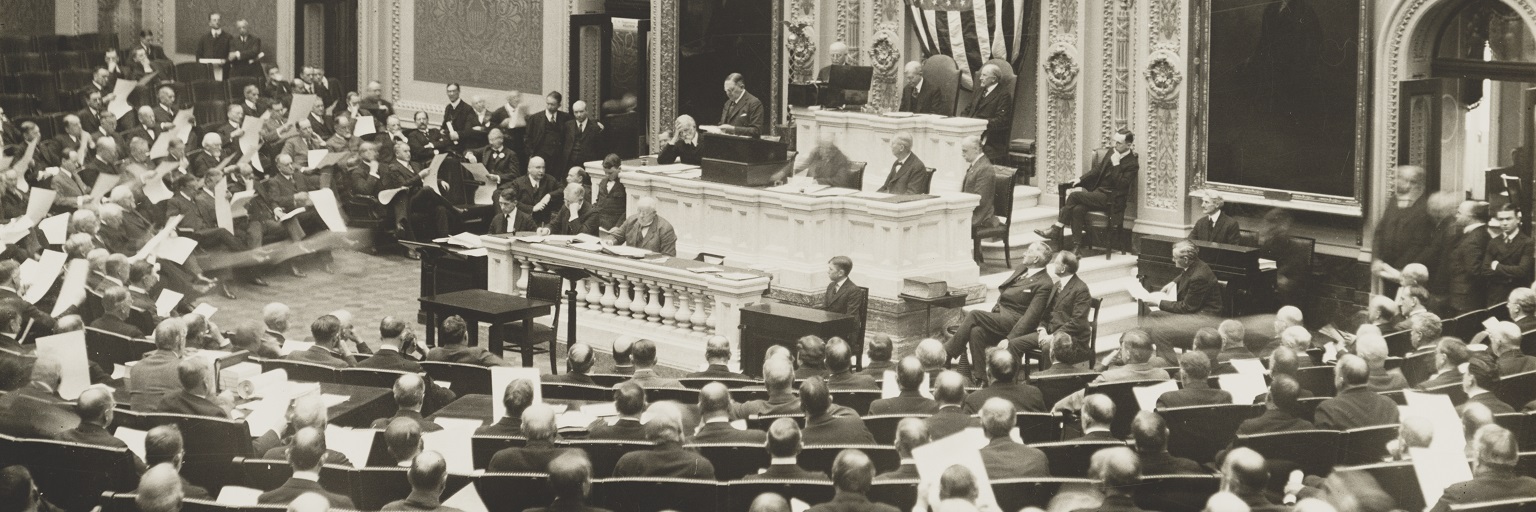The Election of 1876
This disputed election concerned Democrat Samuel Tilden who ran against Republican Rutherford B. Hayes for President of the United States. Tilden led in the popular vote and appeared poised to win the electoral college majority, but three states were in doubt: Florida, Louisiana, and South Carolina, with 19 electoral votes, and there was one electoral vote in Oregon that was awarded to Tilden was also in question. If Hayes won those electoral votes, he would beat Tilden, despite the popular vote. Both candidates claimed they had prevailed. In January 1877, with the election still hotly contested, Congress created an Electoral Commission to determine the votes to count and resolve the dispute. The Commission included 5 senators, 5 representatives, and 5 justices of the Supreme Court, divided between Democrats and Republicans. Ultimately, a compromise was struck to settle the election, whereby federal troops would pull out of Southern states, thus ending Reconstruction, and the Commission would decide in favor of Hayes and he would receive the disputed electoral votes to win the Presidency.
The Election of 2000
This disputed election concerned Democrat Al Gore who ran against Republican George W. Bush and the disputed electoral votes in Florida. Gore won the popular vote, but it initially looked like he had lost the electoral vote when Bush took the lead in Florida, and Gore conceded. He then retracted his concession when the margin narrowed to fewer than 600 votes. The nature of the ballots in Florida also came under scrutiny as the layout of the candidates had confused some voters and the nature of the paper ballot left “hanging chads” or “pregnant chads” with uncompleted punched ballots. The Florida Supreme Court required a statewide manual recount for these undervotes. In Bush v. Gore (2000), the Supreme Court held that the manual recount order was unconstitutional. The result was that by stopping the recount, Bush won Florida’s electoral votes, certified by the Florida Secretary of State, and won the Presidency.
The Election of 2020
The disputed election concerned Democrat Joe Biden and the Republican Incumbent President Donald Trump. Despite taking place during the COVID-19 Pandemic, the election received the highest voter turnout since 1900. Biden won the popular vote and the electoral vote. Trump disputed these results including the legitimacy of mail-in ballots, alleging voter fraud. These claims were dismissed in court. Trump repeatedly claimed he won the election and repeated these claims to supporters. Allegations of fraud and deception led to efforts to stop the certification of the electoral votes in Congress, which led to an attack on the Capitol on January 6, 2021. The election was certified and Joe Biden was inaugurated as President.
Bush v. Gore (2000)
The Supreme Court held that the Florida Supreme Court’s order for manual recounts of ballots in the 2000 Presidential election was unconstitutional under the Equal Protection Clause of the 14th Amendment. Learn More
House of Representatives Select Committee to Investigate the January 6th Attack on the United States Capitol (formed on July 1, 2021)
This Committee was established to “investigate and report upon the facts, circumstances, and causes relating to the January 6, 2021, domestic terrorist attack upon the United States Capitol Complex” … “and relating to the interference with the peaceful transfer of power” … “as well as the influencing factors that fomented such an attack on American representative democracy while engaged in a constitutional process.” Learn More
- “The Contentious Election of 1876” by Michael F. Holt, essay under AP US History Study Guide, posted by the Gilder Lehrman Institute of American History
- “Bush v. Gore (2000),” posted by the National Constitution Center
- “Teaching Resources to Help Students Make Sense of the Rampage at the Capitol” (2021), includes videos, activities, lesson plans, and resources for teachers, from The Learning Network, posted by the New York Times
“Ultimate Guide to Jan. 6 hearings: Lesson plans, timeline, key terms” by Evelyn Chi, posted by PBS Newshour Classroom
“Rutherford B. Hayes and the Disputed Election of 1876,” includes handouts and activities, posted by the Bill of Rights Institute
“Bush v. Gore (2000),” includes materials, documents, and activities, posted by the Bill of Rights Institute

